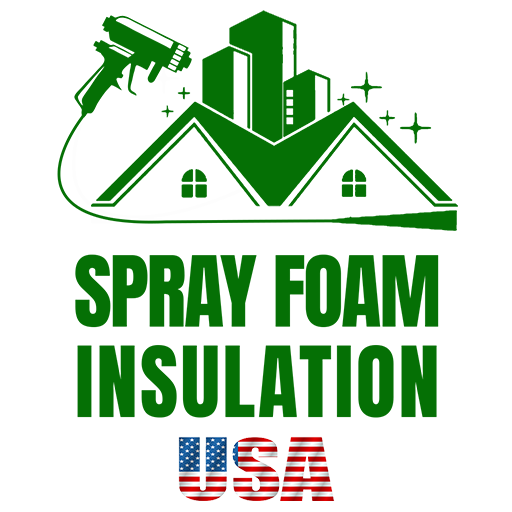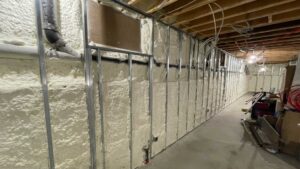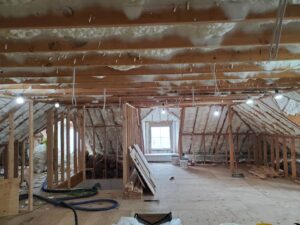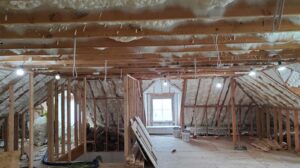When you’re on the hunt for how long does spray foam insulation last, here’s a quick, straight-to-the-point answer you need: Spray foam insulation can last anywhere from 80 to 100 years. This incredible lifespan makes it a once-in-a-generation investment for most homeowners and business owners, ensuring that your property is not just insulated but also energy-efficient and comfortable for decades to come.
Choosing the right insulation for your home or business is a big decision. Not only does it affect your comfort and energy bills, but it also plays a crucial role in the health of your building’s structure. Among the various insulation options, spray foam stands out for its durability, energy efficiency, and ability to provide a comprehensive solution to heat loss and air leaks.
Spray foam insulation, made of polyurethane, is exceptionally durable against temperature variations, moisture buildup, and mold growth. It’s available in two main types: closed-cell and open-cell, with closed-cell being slightly more durable due to its rigid structure. One of the critical advantages of spray foam is its longevity; once installed, you probably won’t need to think about replacing it during your time in the property.
For anyone prioritizing efficiency and longevity in their insulation choice, understanding the lasting benefits of spray foam insulation is crucial. This guide will explore everything you need to know about spray foam’s lifespan, performance, and how it compares to other insulation materials.

Understanding Spray Foam Insulation
When you’re looking into improving your home’s energy efficiency and comfort, insulation is a key factor. Spray foam insulation stands out for its durability, efficiency, and versatility. Let’s break down what spray foam insulation is, the types available, its chemical makeup, and the application process.
Types of Spray Foam Insulation
There are two main types of spray foam insulation: open-cell and closed-cell.
- Open-cell spray foam is softer and less dense, with a sponge-like texture. It’s great for soundproofing and indoor applications.
- Closed-cell spray foam is denser and more rigid, offering higher insulating power and moisture resistance. It’s ideal for both indoor and outdoor use, including in areas prone to moisture.
Chemical Composition
Spray foam is made from two key materials: isocyanate and polyol resin. When these materials mix, they react and expand up to 30-60 times their liquid volume. This expansion allows the foam to fill cracks and crevices, creating an effective seal.
Application Process
The application of spray foam insulation is a task for professionals. It involves:
- Preparation: Clearing the area of dust, debris, and old insulation materials to ensure a clean surface.
- Mixing: Combining the isocyanate and polyol resin in precise ratios.
- Spraying: Using specialized equipment, the mixture is sprayed onto the target area. It expands and hardens, forming a durable insulative layer.
The process requires expertise to ensure the foam is applied evenly and at the correct thickness. This not only maximizes insulation efficiency but also ensures the longevity of the insulation.

Understanding these basics of spray foam insulation helps homeowners appreciate why it’s considered a premium choice for insulation. Whether you’re building a new home or upgrading your existing one, knowing how long does spray foam insulation last, its types, chemical makeup, and application process is essential for making an informed decision.
With its ability to last up to 100 years, spray foam insulation is a long-term investment in your home’s comfort and energy efficiency. The right type of spray foam and proper installation can maximize these benefits, making your home more sustainable and cost-effective in the long run.
Lifespan of Spray Foam Insulation
When we talk about making your home snug and energy-efficient, one of the first things that come to mind is insulation. And not just any insulation, but spray foam insulation. Why? Because it’s known for its longevity and effectiveness. So, how long does spray foam insulation last? Let’s dive into the details.
80 to 100 Years of Cozy
Yes, you read that right. Spray foam insulation can last from 80 to 100 years. This means once it’s installed, it could very well last for the lifetime of your home. Imagine installing something today that your great-grandchildren could benefit from without needing to replace it. That’s the kind of long-term value spray foam insulation brings to the table.
Closed-cell vs. Open-cell
There are two heroes in the story of spray foam insulation: closed-cell and open-cell. Both are great, but they have their unique strengths.
-
Closed-cell spray foam is the tougher one. It’s dense, acts as a moisture barrier, and adds structural strength to your walls. Because of its rigidity, it tends to last a bit longer and is especially good for areas prone to moisture.
-
Open-cell spray foam is softer and more flexible. It’s excellent for soundproofing and is generally more cost-effective. While it also boasts a long lifespan, it’s not as moisture-resistant as its closed-cell counterpart.
Factors Affecting Longevity
While spray foam insulation is incredibly durable, a few factors can affect how long it lasts:
-
Professional Installation: This is key. A pro knows how to avoid the common pitfalls that can reduce the insulation’s effectiveness and lifespan.
-
Moisture: Closed-cell spray foam is better at handling moisture. In areas prone to dampness, choosing the right type of spray foam is crucial.
-
Temperature Fluctuations: Both types of spray foam can handle temperature changes well, but extreme conditions can test their limits over decades.
-
UV Exposure: Direct sunlight can degrade spray foam over time. It’s usually protected by walls or roofing, but exposed areas need special attention.
-
Physical Damage: Though tough, spray foam isn’t immune to physical damage. Keeping it protected from mechanical harm helps preserve its integrity.
In short, with the right choice between closed-cell and open-cell, professional installation, and appropriate care, spray foam insulation can be a century-long guardian of your home’s comfort and efficiency. It’s an investment that pays off not just in reduced energy bills but in the peace of mind that comes from knowing your home is well-protected for years to come.
Moving forward, we’ll explore the benefits beyond longevity, showcasing why spray foam insulation is about more than just its impressive lifespan.
Comparing Insulation Materials
When it comes to insulating your home, not all materials are created equal. Let’s break down how spray foam stacks up against other popular choices like fiberglass, cellulose, and mineral wool.
Spray Foam
- Lifespan: 80 to 100 years. It’s a marathon runner in insulation, offering durability that’s hard to beat.
- R-Value: From R-3.5 to R-6.5 per inch. This means it’s highly efficient at keeping heat in or out, depending on the season.
- Cost-Effectiveness: While the initial cost might be higher, the savings on energy bills can reach up to 40%, making it a smart long-term investment.
- Other Benefits: It’s a champion at air sealing, resistant to moisture and mold, and also adds structural strength to your home.
Fiberglass
- Lifespan: 25 to 50 years. Not bad, but not as enduring as spray foam.
- R-Value: From R-2.2 to R-4.2 per inch. It’s effective, but you might need more of it to match the efficiency of spray foam.
- Cost-Effectiveness: It’s cheaper upfront, making it an attractive option for those on a tight budget.
- Other Considerations: It can sag or compress over time, especially if it gets wet, reducing its effectiveness.
Cellulose
- Lifespan: 25 to 50 years, similar to fiberglass.
- R-Value: From R-3.1 to R-3.7 per inch. It does a good job, especially in preventing air infiltration.
- Eco-Friendly: Made from recycled paper, it’s a greener choice.
- Watch Out For: It can absorb moisture and settle over time, potentially diminishing its insulating capabilities.
Mineral Wool
- Lifespan: Can last for the life of your home, 80-100 years, similar to spray foam.
- R-Value: Comparable to fiberglass, but it’s denser, offering better soundproofing.
- Cost: It’s on the pricier side, much like spray foam, but without the same level of air sealing benefits.
- Other Benefits: Fire resistant and doesn’t absorb moisture, making it a durable choice.
In Summary:
Choosing the right insulation material is crucial for your home’s energy efficiency and comfort. While spray foam might have a higher initial cost, its long lifespan, superior R-value, and additional benefits like moisture resistance and structural reinforcement make it a standout choice. Fiberglass and cellulose are more budget-friendly but may require more maintenance and eventual replacement. Mineral wool is a solid contender for durability and fire resistance but doesn’t provide the same level of air sealing as spray foam.
Investing in insulation is investing in the future comfort, safety, and efficiency of your home. Choose wisely, and consider not just the upfront costs but the long-term benefits and savings.
Let’s address some common concerns homeowners have about spray foam insulation, including myths about roof damage and breakdown over time.
Benefits Beyond Longevity
When we talk about spray foam insulation, it’s not just about how long does spray foam insulation last. Its lifespan of 80 to 100 years is impressive, but the benefits don’t stop there. Let’s dive into some of the other advantages that make spray foam insulation a standout choice.
Energy Efficiency
One of the most celebrated benefits of spray foam insulation is its energy efficiency. This insulation type can reduce your energy bills by up to 40%. It’s a significant saving that makes the initial investment worthwhile. The secret behind these savings? Spray foam’s high R-Value, ranging from R-3.5 to R-6.5 per inch of thickness, which effectively resists heat flow.
Property Value
Installing spray foam insulation can increase your property value by 3% to 6%. New homebuyers often look for homes with energy-efficient upgrades. A well-insulated home not only saves on energy costs but also promises a comfortable living environment. This increase in value is a direct benefit to homeowners who might consider selling their property in the future.
Pest Resistance
No one likes uninvited guests, especially pests and rodents. Spray foam insulation is treated with substances like boric acid, making it an unwelcoming environment for these critters. By sealing gaps and cracks, spray foam also physically blocks entry points, keeping your home pest-free.
Mold Prevention
Mold thrives in damp and humid conditions. Spray foam insulation creates a barrier that prevents moisture accumulation, inhibiting mold growth. This is crucial for maintaining a healthy indoor environment and avoiding the structural damage mold can cause.
Sound Absorption
Living in a noisy neighborhood or near busy streets can be less than ideal. Spray foam insulation offers excellent sound absorption properties, creating a quieter and more peaceful living environment. By sealing gaps and cracks, it effectively blocks outside noise, making your home a serene sanctuary.
In summary, spray foam insulation offers a multitude of benefits beyond its impressive longevity. From energy savings and increased property value to pest resistance, mold prevention, and sound absorption, the advantages are clear. As we address common concerns about spray foam insulation, choosing spray foam is not just about insulating your home; it’s about enhancing your quality of life.
Common Concerns Addressed
When considering spray foam insulation, some homeowners have questions. Let’s address these head-on.
Roof Damage
One worry is that spray foam insulation might damage the roof. The truth is, when applied correctly by professionals, spray foam can actually strengthen your roof. It adds a layer of protection against the elements and can improve the structural integrity of your roof. No need to worry about damage—professional installation ensures your roof is safe.
Breakdown Over Time
“How long does spray foam insulation last?” is a common question. The answer is reassuring. Spray foam insulation is designed to last a lifetime, with an impressive lifespan of 80 to 100 years. Unlike traditional insulation materials that can sag or settle, spray foam maintains its form and effectiveness, ensuring your home stays insulated decade after decade.
Cost-effectiveness
Some might hesitate at the initial cost of spray foam insulation. However, it’s important to consider the long-term savings. Because of its superior insulating properties, spray foam can significantly reduce your energy bills. Over time, the insulation pays for itself through these savings. Plus, with minimal maintenance requirements, you’re looking at a cost-effective solution in the long run.
Deterioration Factors
While spray foam insulation is robust, certain factors can affect its longevity. The main culprits include incorrect installation and exposure to extreme conditions without adequate protection. Choosing a certified and experienced installer is crucial to avoid these pitfalls. Properly installed spray foam is resistant to water, pests, and most forms of wear and tear, ensuring it lasts as long as it’s supposed to.
By choosing professional installation and understanding the nature of spray foam insulation, you can alleviate these common concerns. The key to maximizing the benefits of spray foam insulation lies in proper application and maintenance. With these in place, you can enjoy a comfortable, energy-efficient home for years to come.
Let’s explore some frequently asked questions about spray foam insulation to further clarify its benefits and suitability for your home.
Maximizing the Lifespan of Your Spray Foam Insulation
Ensuring your spray foam insulation lasts as long as possible isn’t just about applying the foam and forgetting it. Like most parts of your home, a little attention goes a long way. Here’s how you can make sure you get the most out of your insulation for decades to come.
Professional Installation
First things first: get it done right. The longevity of spray foam insulation starts with professional installation. Why? Because professionals know exactly how to mix and apply the foam to avoid common pitfalls. They ensure:
- The right thickness of foam is applied
- The area is properly prepared and dry
- The correct type of foam is used for your specific needs
Mistakes during installation are the biggest factor that could shorten the lifespan of your insulation. A certified installer, like those with Spray Polyurethane Foam Alliance (SPFA) Master Installer certification, brings expertise and credibility to the job.
Avoiding Common Mistakes
Common mistakes can drastically reduce the effectiveness and longevity of your spray foam insulation. Here’s what to avoid:
- Applying Over Wet or Dirty Surfaces: Moisture and dirt can prevent the foam from adhering properly.
- Incorrect Thickness: Too thin, and you won’t get the insulation you need. Too thick, and it might not cure properly.
- Ignoring Manufacturer’s Instructions: Every product is different. Using it incorrectly can lead to poor insulation and wasted money.
An expert installer knows how to dodge these errors, ensuring your insulation does its job for a long time.
Maintenance Tips
While spray foam is largely a “set it and forget it” solution, a bit of vigilance can help it last even longer. Here’s what you can do:
- Regular Checks: Once a year, take a look at your insulation. If you have access to areas where it’s applied, like your attic or crawl space, check for any signs of damage or unusual wear.
- Keep It Dry: Make sure areas with spray foam insulation stay dry. If you find leaks in your roof or walls, get them fixed promptly to avoid water damage.
- Avoid Sunlight Exposure: If spray foam is used in areas that might get sunlight, consider covering it with a protective layer. UV rays can degrade the foam over time.
By following these simple maintenance tips, you can help ensure your spray foam insulation lasts as long as your home does.
Wrapping Up
The secret to maximizing the lifespan of your spray foam insulation lies in professional installation, avoiding common mistakes, and a bit of routine maintenance. By taking these steps, you can enjoy the benefits of spray foam insulation—like energy efficiency and comfort—for decades to come.
As we transition to the next section, keep these tips in mind. They’re not just about prolonging the life of your insulation; they’re about making your home a better place to live, both now and in the future.
Next, let’s address some frequently asked questions about spray foam insulation to help you make informed decisions about protecting and enhancing your home.
FAQs about Spray Foam Insulation
When it comes to making your home more energy-efficient and comfortable, spray foam insulation is a topic that comes up often. Let’s dive into some common questions you might have.
Does Spray Foam Insulation Break Down Over Time?
The short answer is, not really. Spray foam insulation is designed for the long haul, boasting a lifespan that can stretch from 80 to 100 years if properly applied. This durability comes from its unique chemical composition which, unlike traditional insulation materials like fiberglass or cellulose, does not sag, compress, or lose its effectiveness over time. However, it’s worth noting that like anything in your home, ensuring it’s correctly installed and maintained is key to its longevity.
Is Spray Foam Insulation Worth the Investment?
Absolutely. While the initial cost might be higher than other insulation types, the long-term savings and benefits can’t be overstated. Spray foam insulation can reduce your energy bills by up to 40%, thanks to its high R-value and ability to create an airtight seal. This not only makes your home more energy-efficient but also more comfortable by eliminating drafts and cold spots. Plus, with its impressive lifespan, it’s likely a one-time investment for the lifetime of your home. Considering these factors, spray foam insulation pays for itself many times over.
How Does Spray Foam Compare to Other Insulation Types?
When comparing spray foam to other insulation materials such as fiberglass, cellulose, or mineral wool, a few key differences stand out:
- Lifespan: Spray foam insulation lasts significantly longer, with an expected lifespan of 80 to 100 years, compared to 25 to 50 years for fiberglass and cellulose.
- Energy Efficiency: With an R-value ranging from R-3.5 to R-6.5 per inch, spray foam often provides superior insulation compared to fiberglass (R-2.2 to R-4.2) and cellulose (R-3.1 to R-3.7).
- Air Sealing: Unlike other materials, spray foam expands to fill gaps and cracks, creating an airtight seal that can significantly reduce air leaks and improve energy efficiency.
- Moisture and Pest Resistance: Spray foam is resistant to moisture and pests, providing added protection against mold, mildew, and infestations.
In summary, while each type of insulation has its place, spray foam insulation offers a combination of longevity, energy efficiency, and protective benefits that are hard to match.
Remember that choosing the right insulation for your home is a decision that affects not just your comfort but also your wallet and the environment. Spray Foam Insulation USA is here to guide you through that decision, offering solutions that are not only effective but also sustainable.
Conclusion
In wrapping up our comprehensive journey through spray foam insulation, it’s clear that this option stands out not just for its unparalleled durability but also for its significant contributions to eco-friendly living and sustainable home environments. At Spray Foam Insulation USA, our commitment to providing you with top-tier insulation solutions is matched by our dedication to the planet.
Spray Foam Insulation USA: We pride ourselves on being more than just an insulation company. We are your partners in creating a more energy-efficient, comfortable, and sustainable home. Our spray foam insulation services are designed to meet the unique needs of your property, ensuring maximum efficiency and longevity. With a lifespan of 80 to 100 years, our spray foam insulation is a testament to our commitment to quality and durability.
Eco-friendly Solutions: The importance of reducing our carbon footprint cannot be overstated. Our spray foam insulation is not only effective in keeping your home warm in the winter and cool in the summer but also plays a crucial role in minimizing energy consumption. By using products with lower global warming potential and adhering to global treaties and EPA regulations, we ensure that our insulation solutions contribute positively to the environment.
Sustainable Living: Choosing spray foam insulation is a step towards sustainable living. Not only does it reduce the need for frequent replacements due to its long lifespan, but it also contributes to a significant decrease in energy bills. By sealing your home from air leaks and creating an efficient thermal envelope, spray foam insulation ensures that your heating and cooling systems don’t have to work as hard, reducing your home’s energy demand and contributing to a healthier planet.
In conclusion, when you opt for spray foam insulation from Spray Foam Insulation USA, you’re not just choosing a superior insulation solution. You’re making a choice for a more comfortable, energy-efficient, and sustainable future for your home. Our team is dedicated to providing you with not just insulation, but a comprehensive solution that meets your needs today and for generations to come. Let’s work together towards a greener, more sustainable world, one home at a time. Contact us today for a free estimate and take the first step towards a better insulated, more energy-efficient home.





